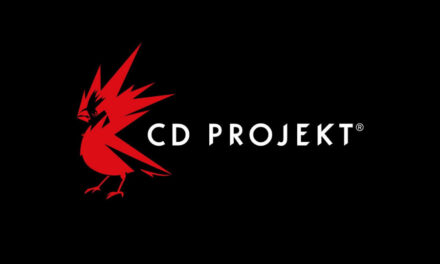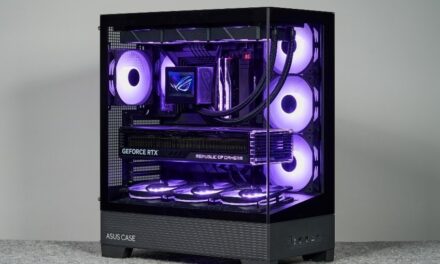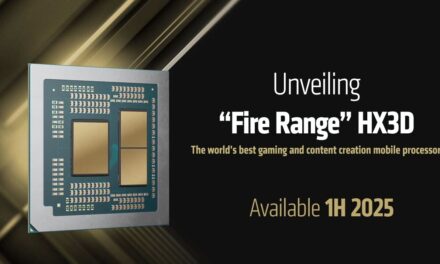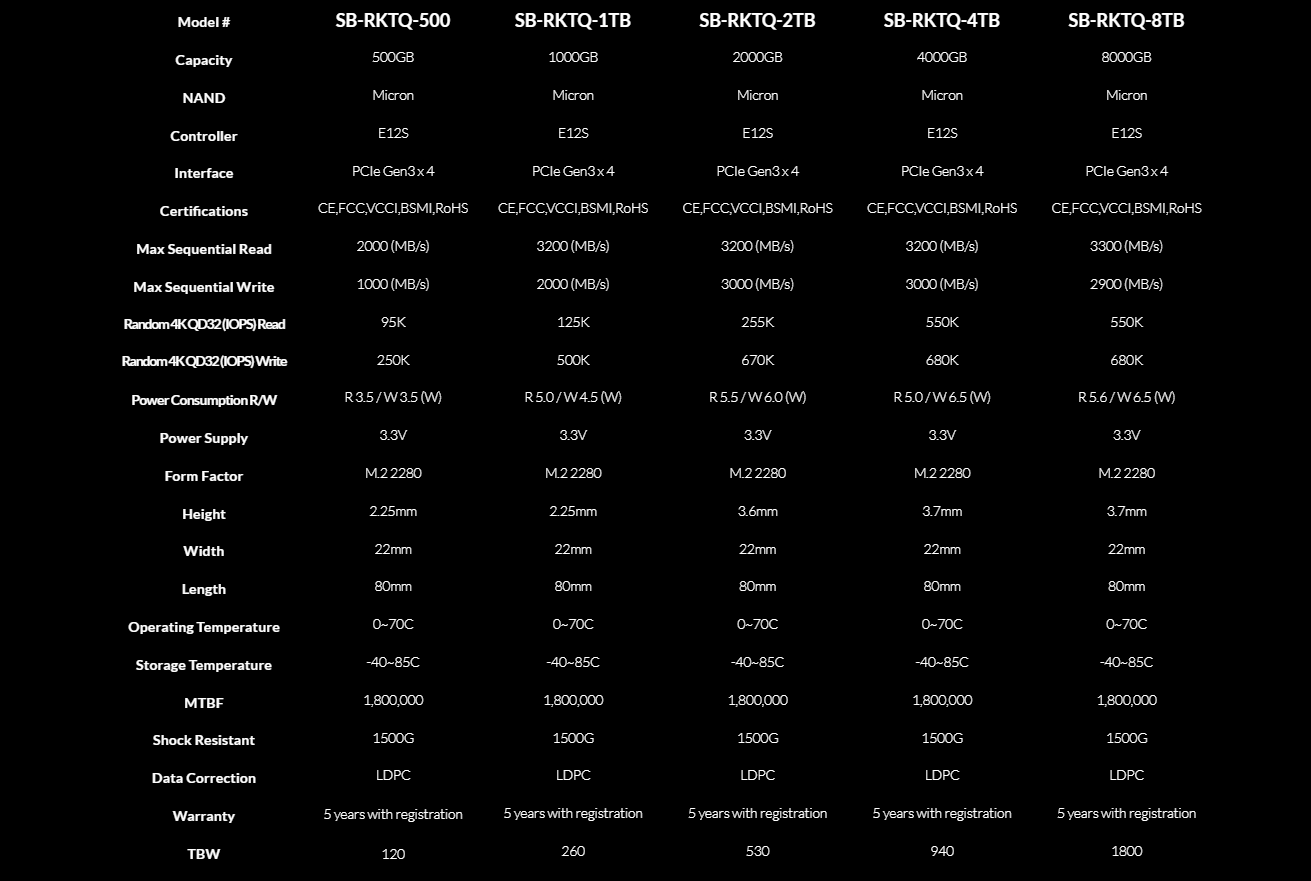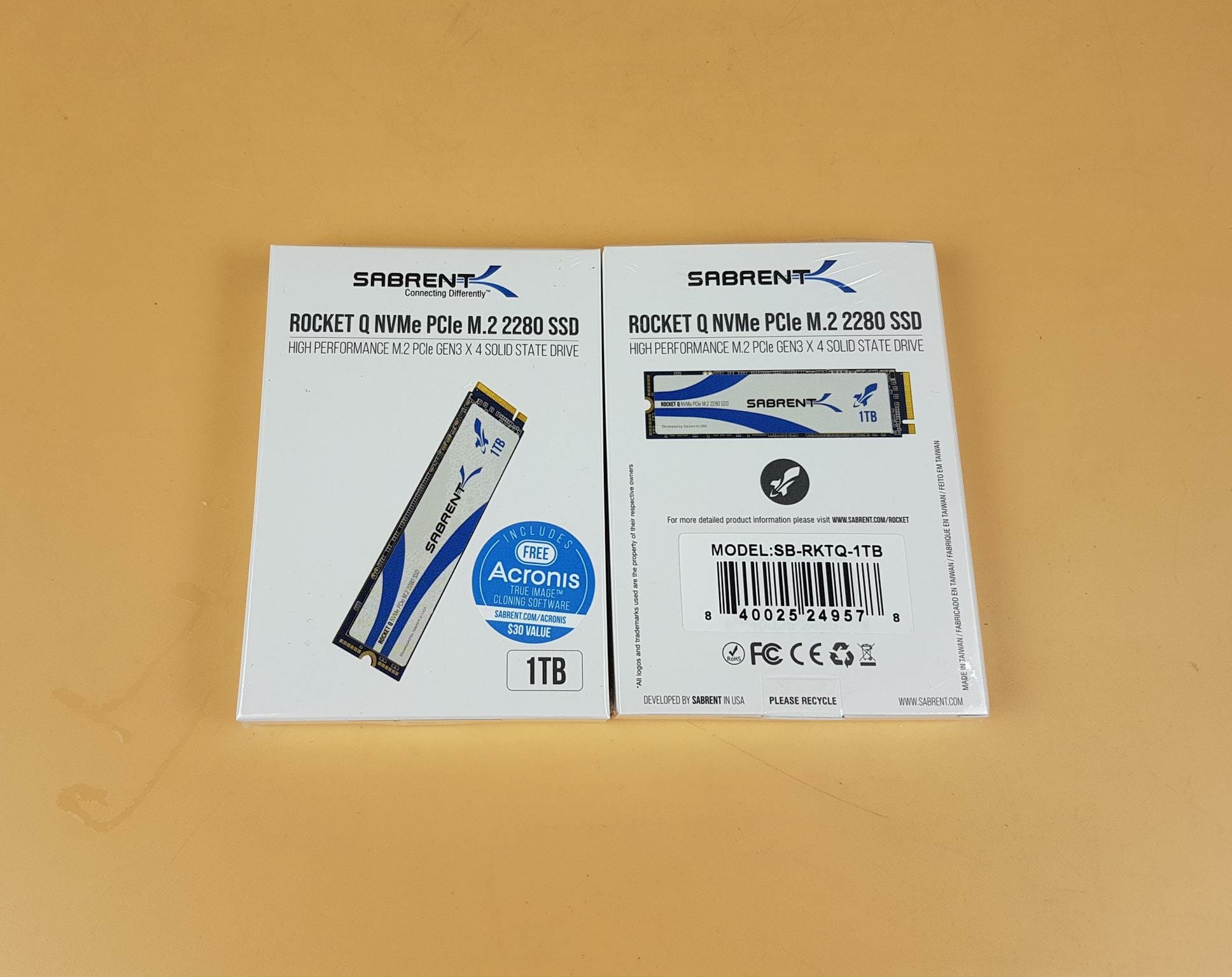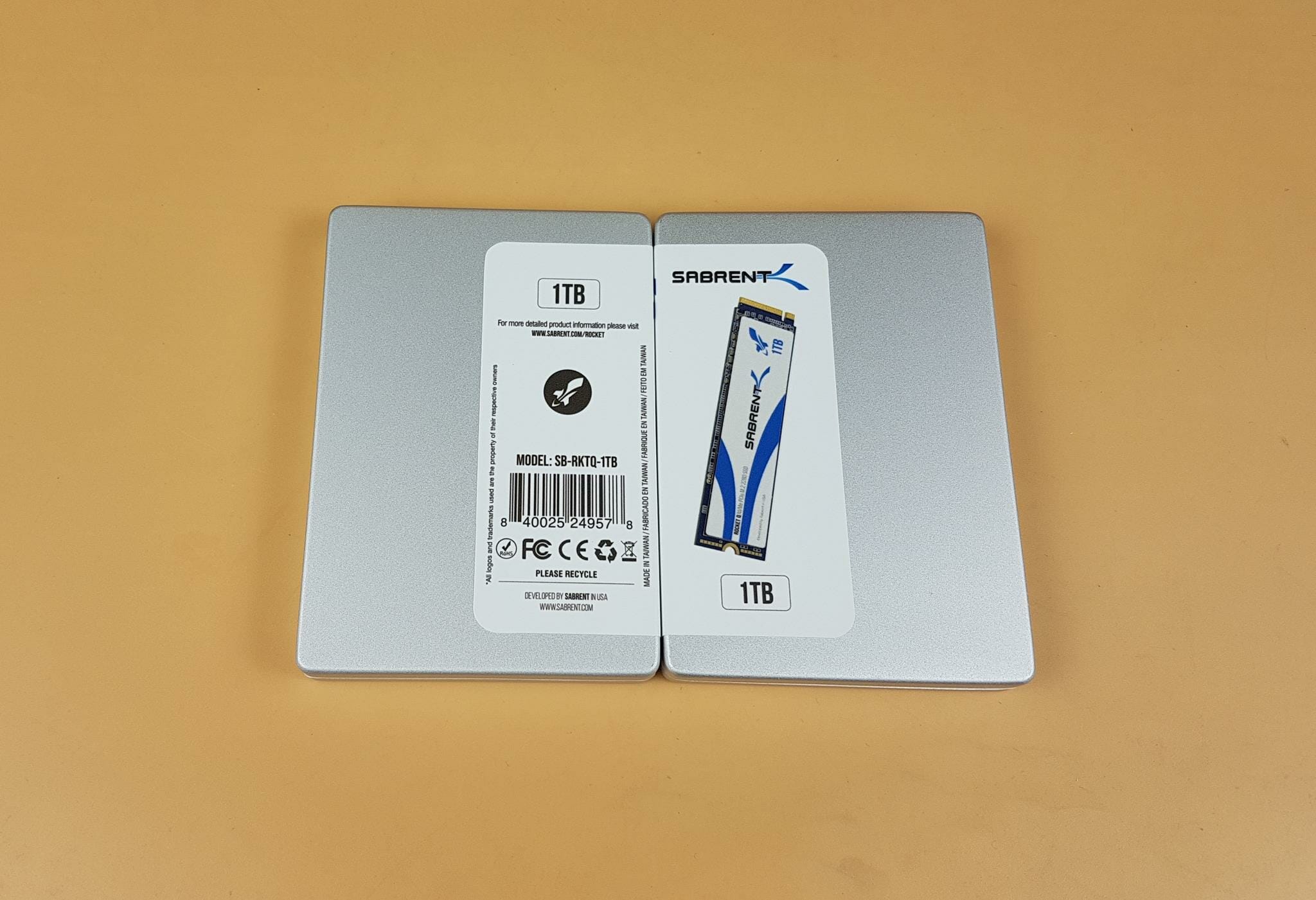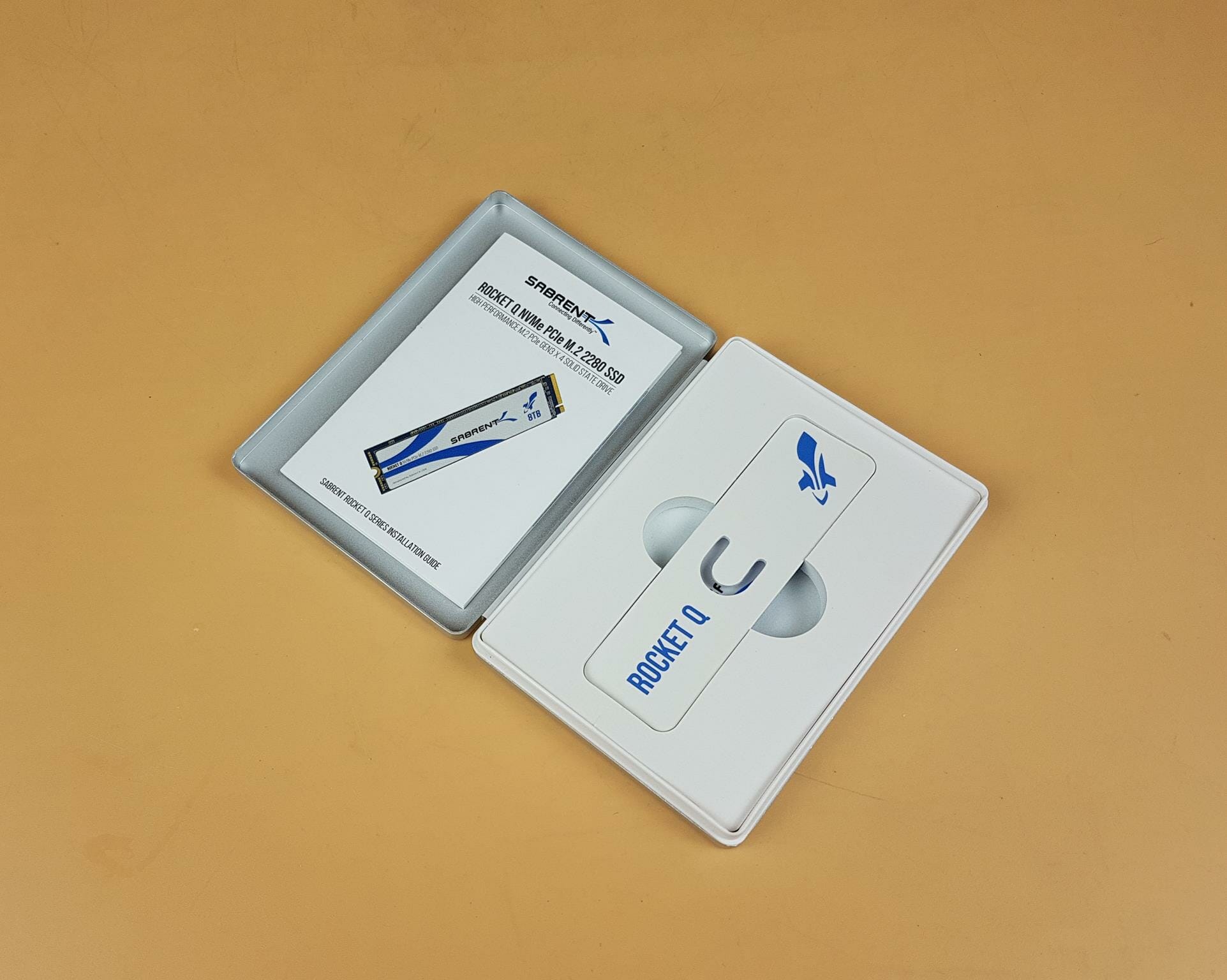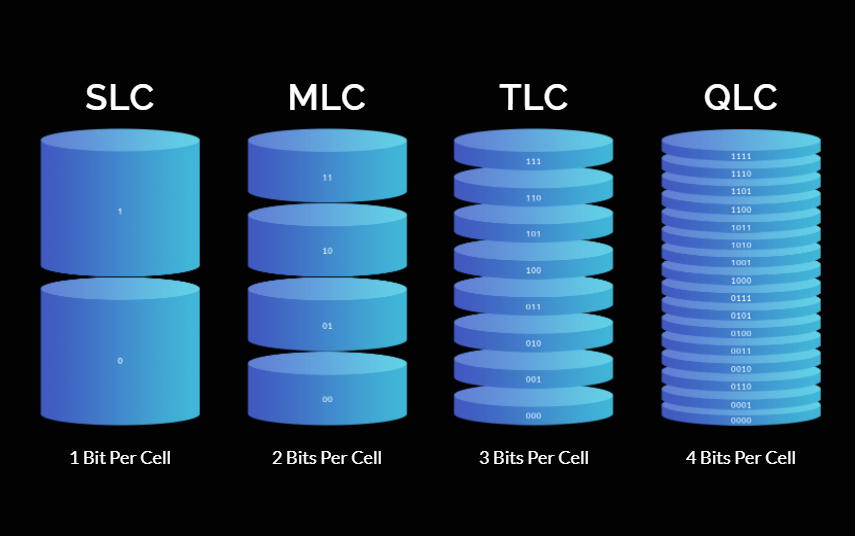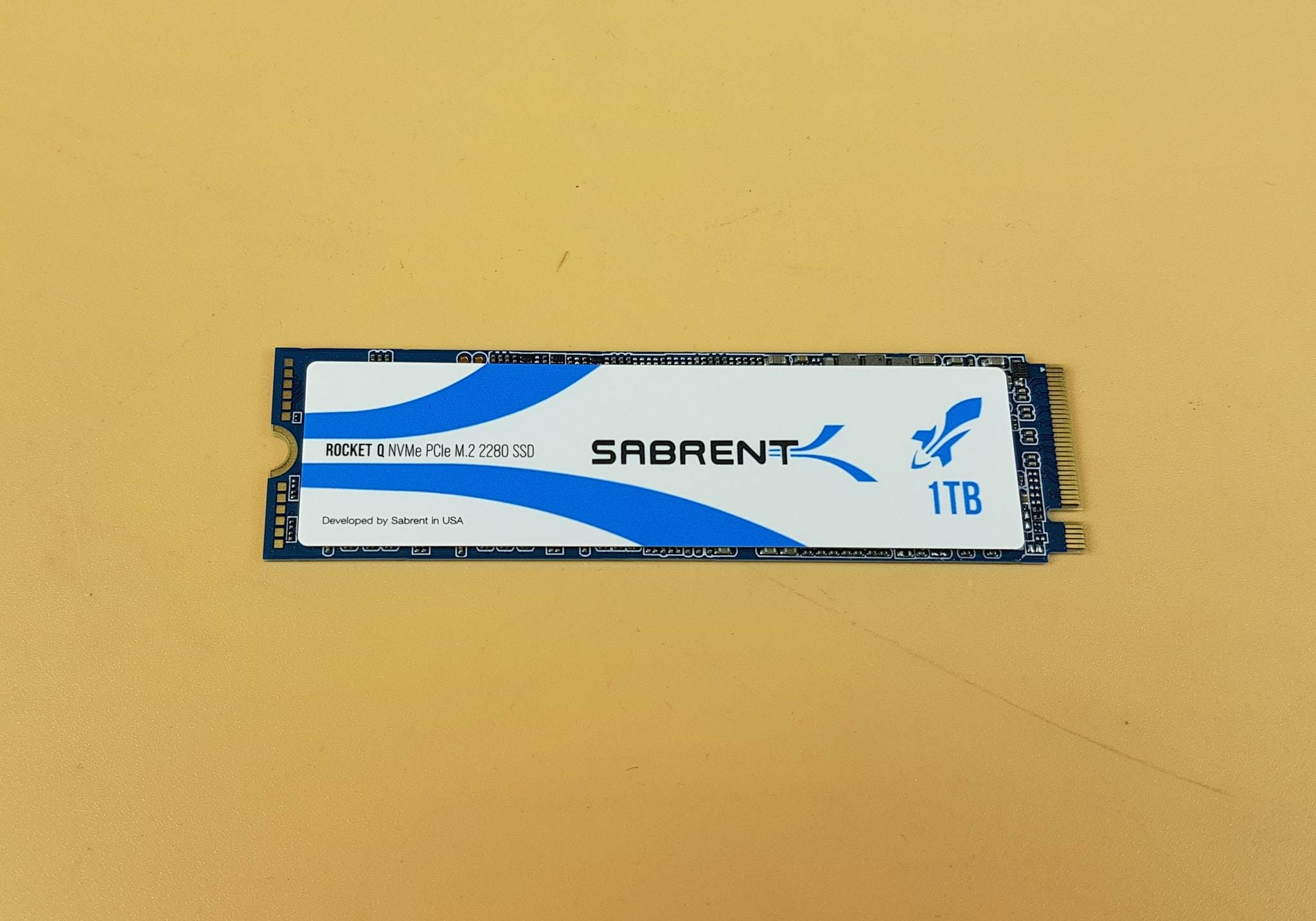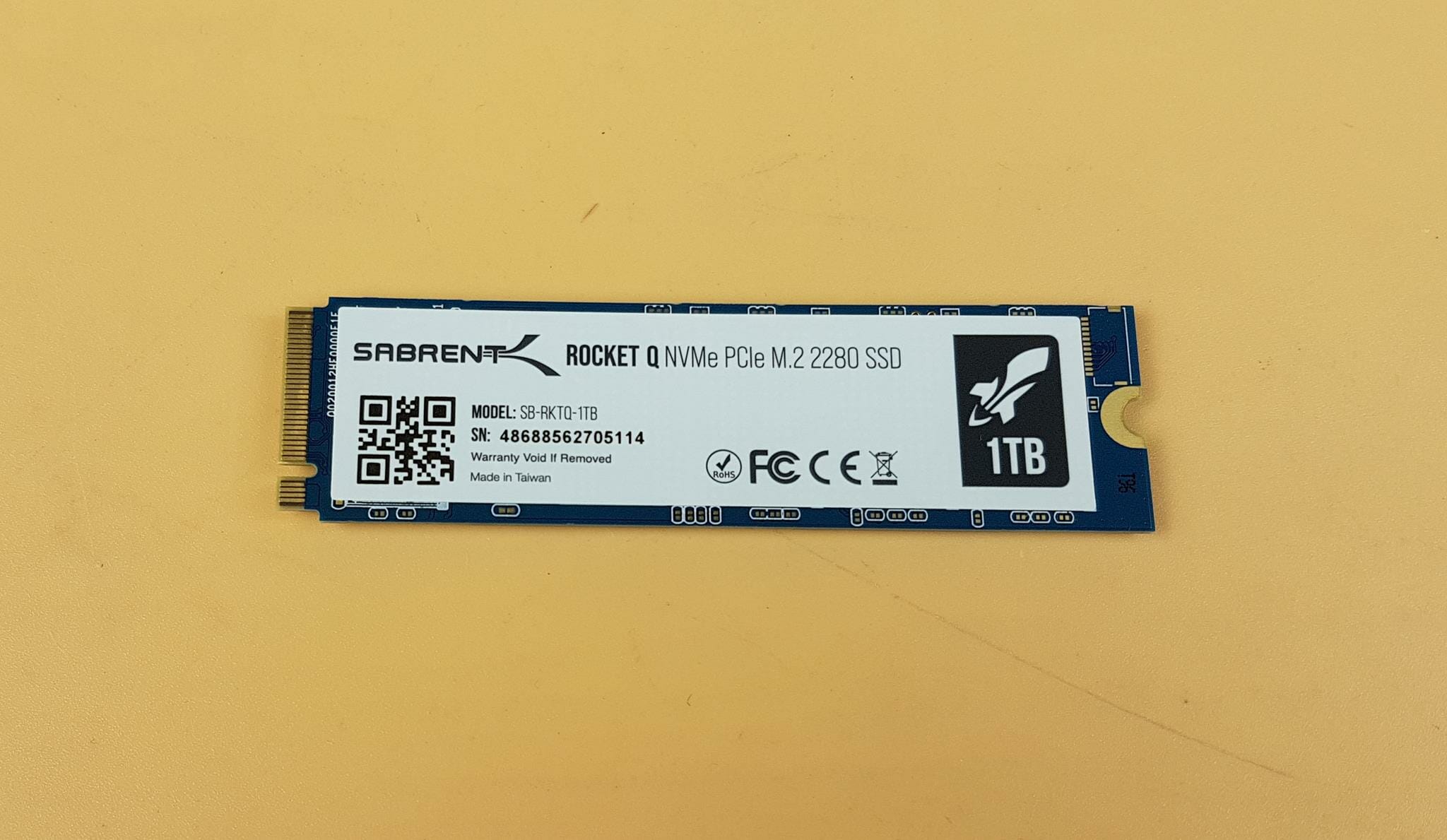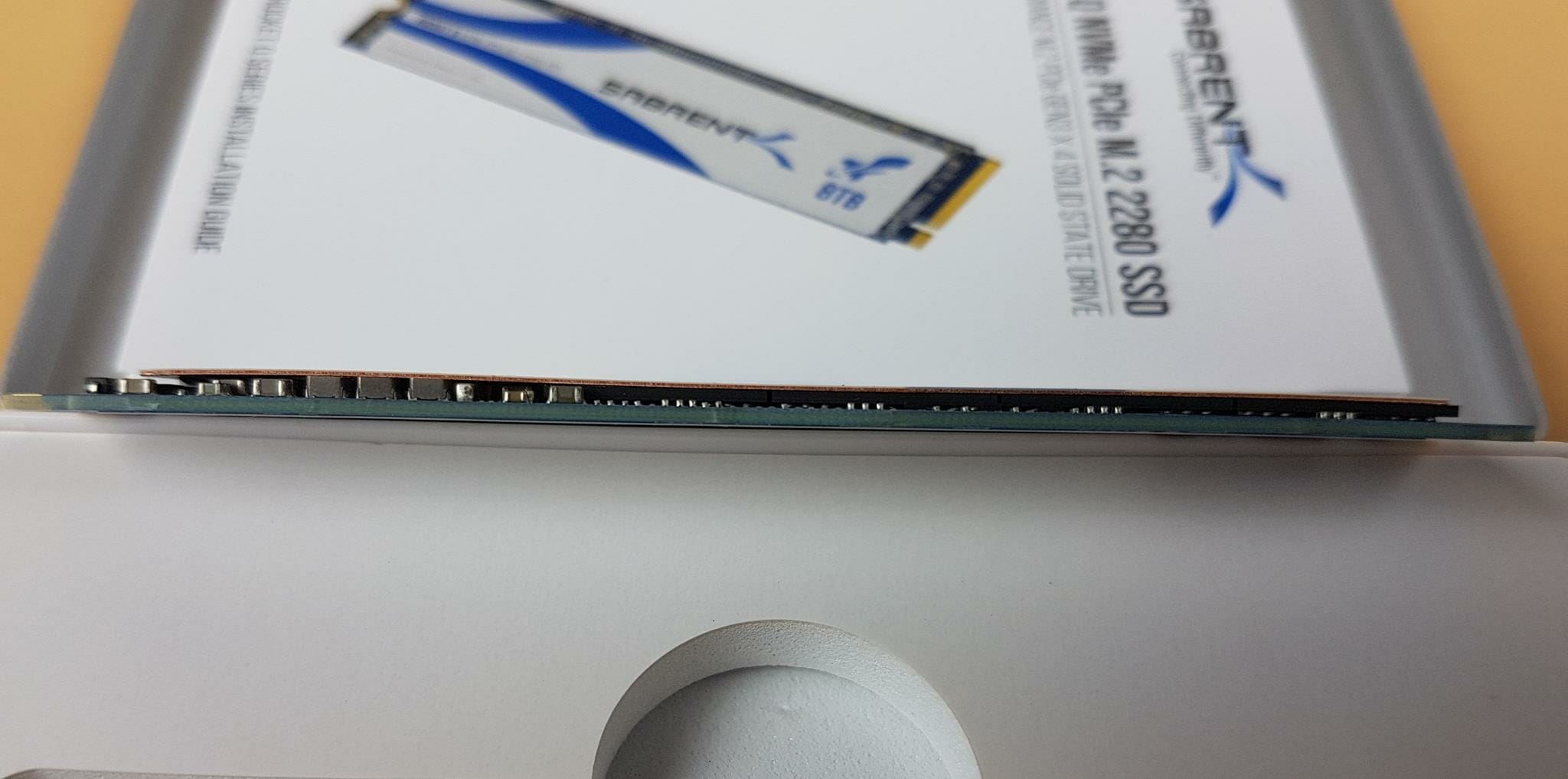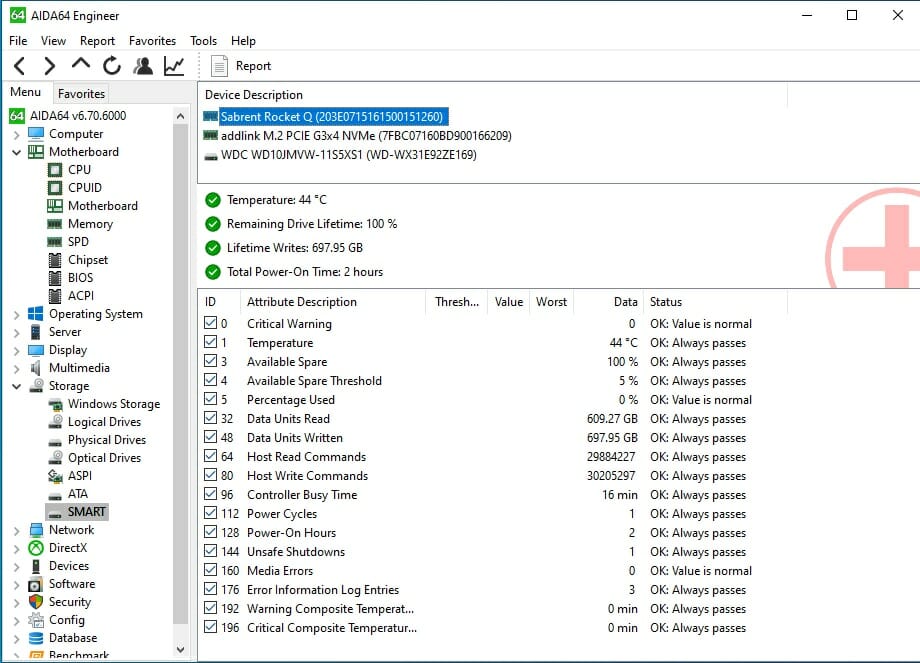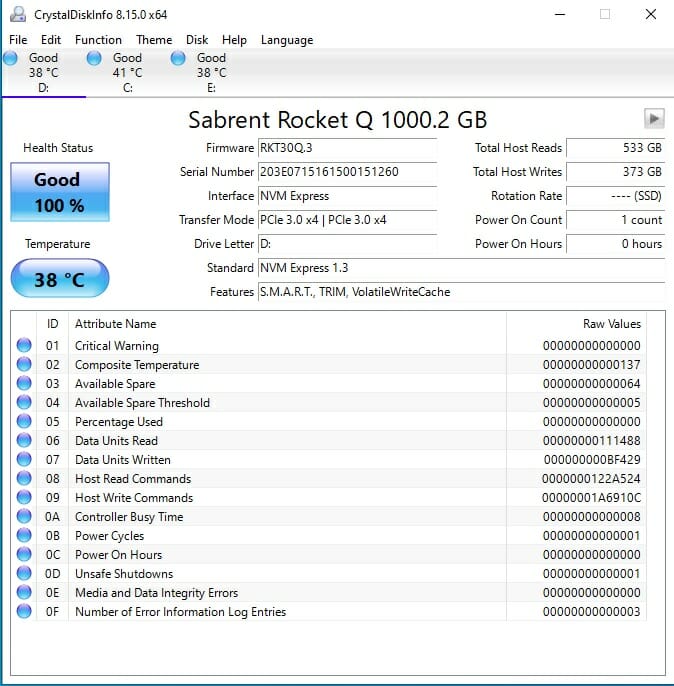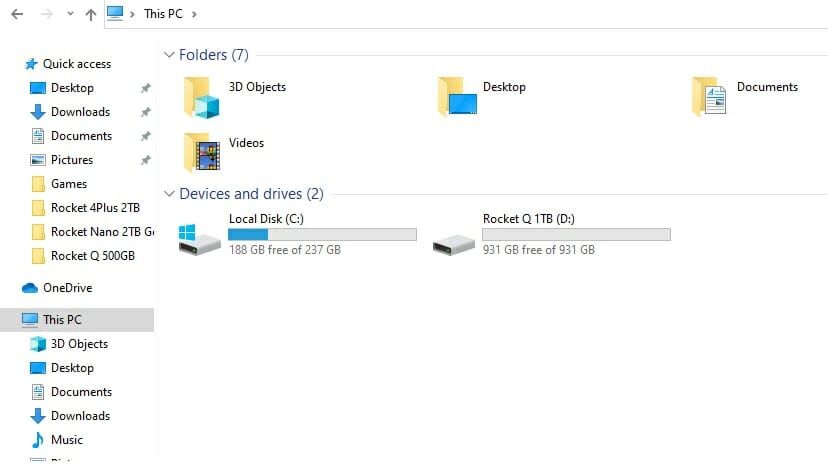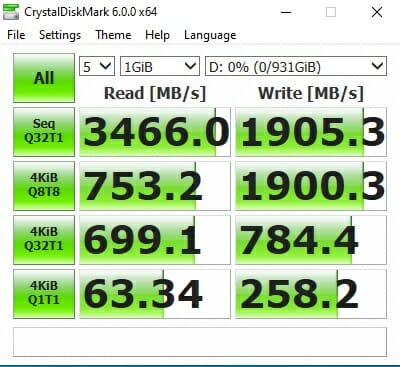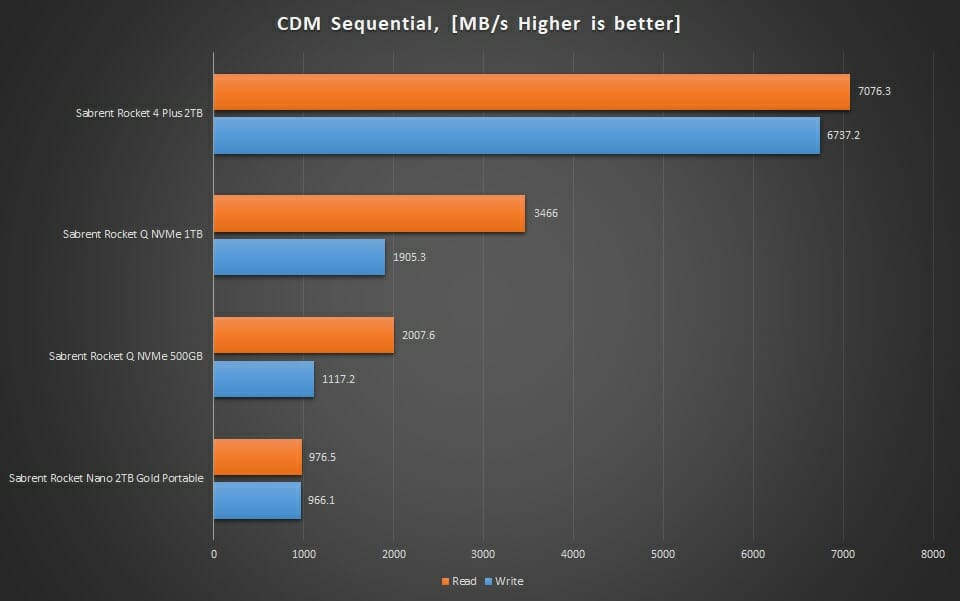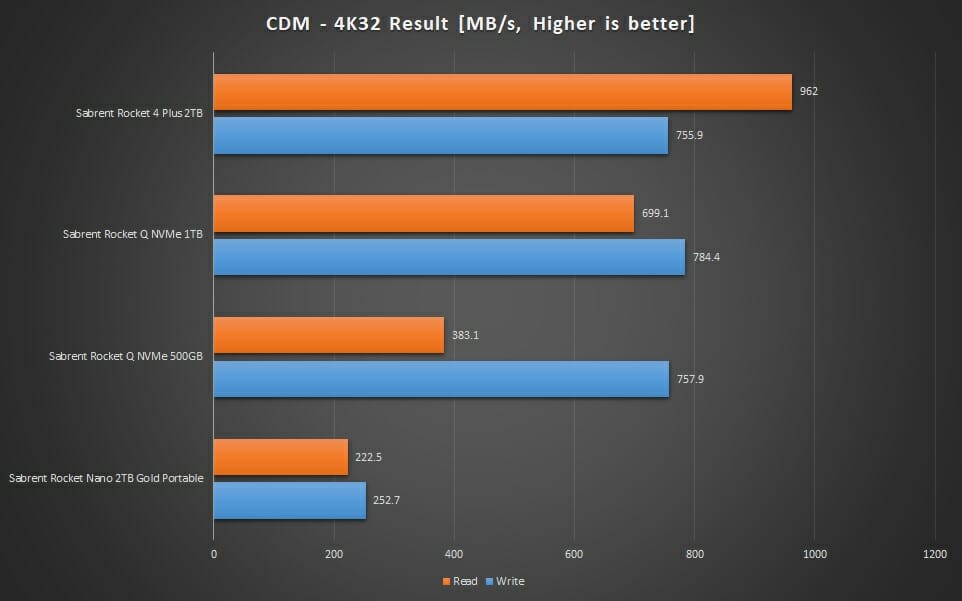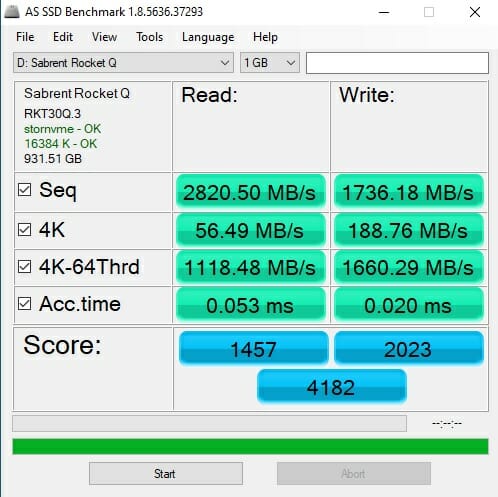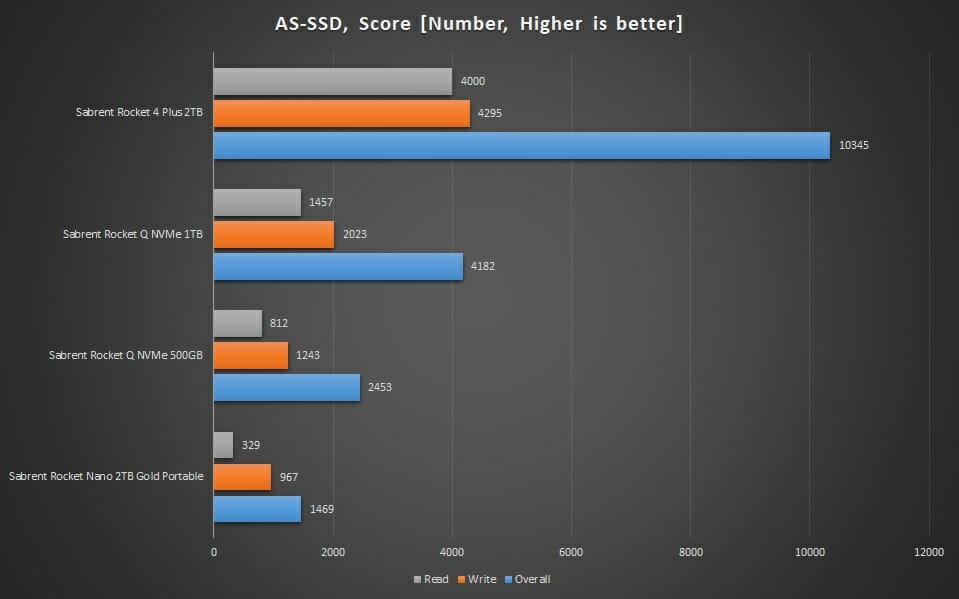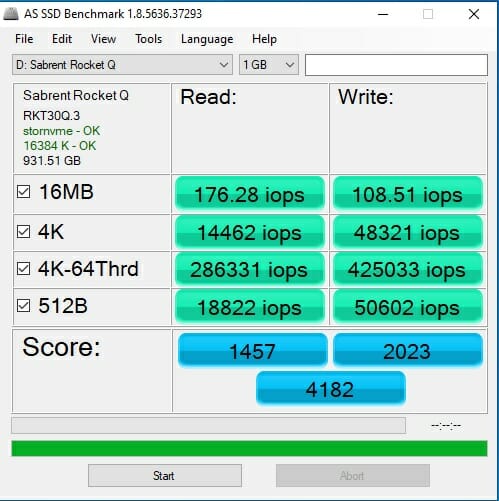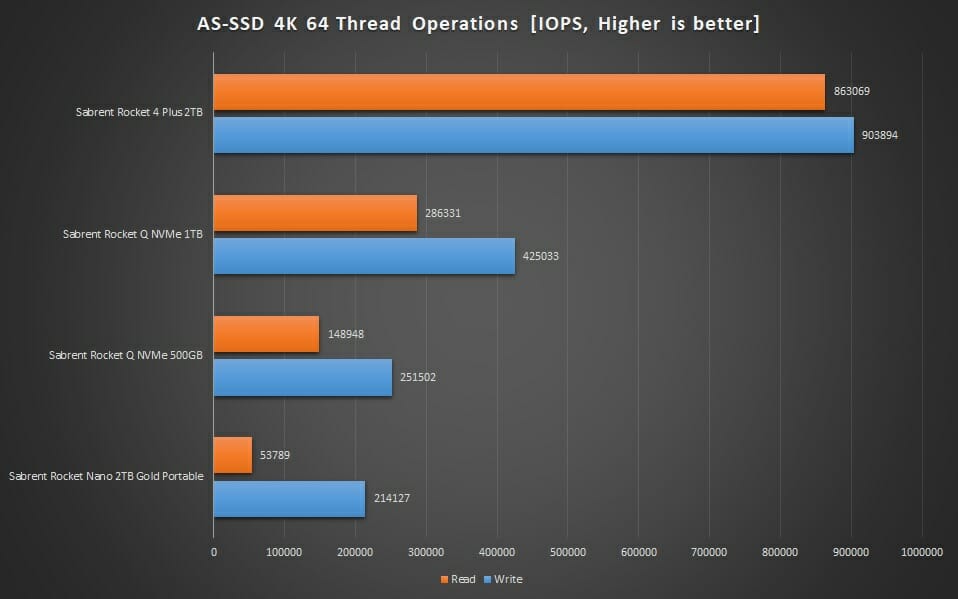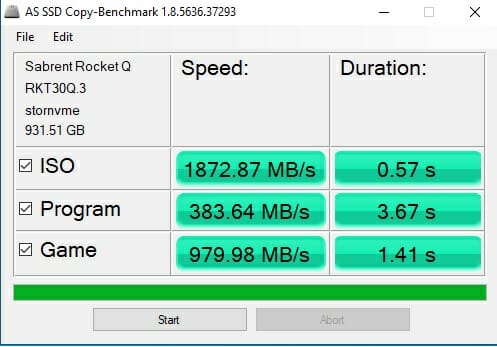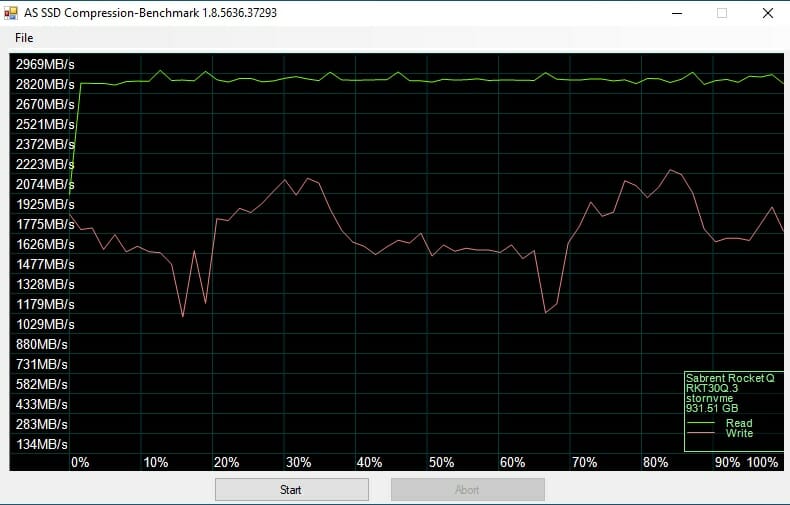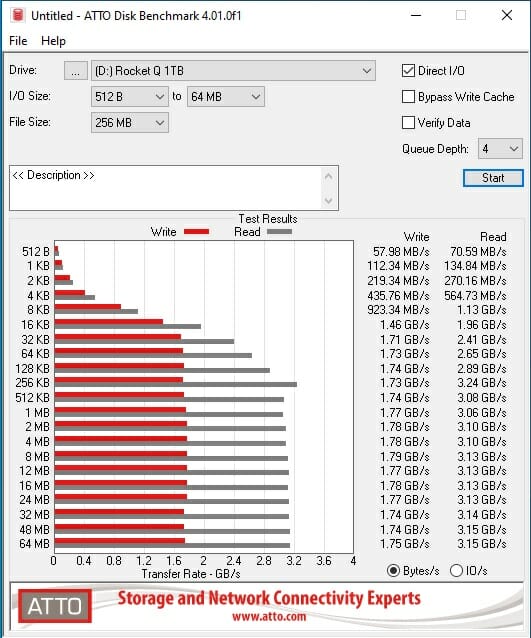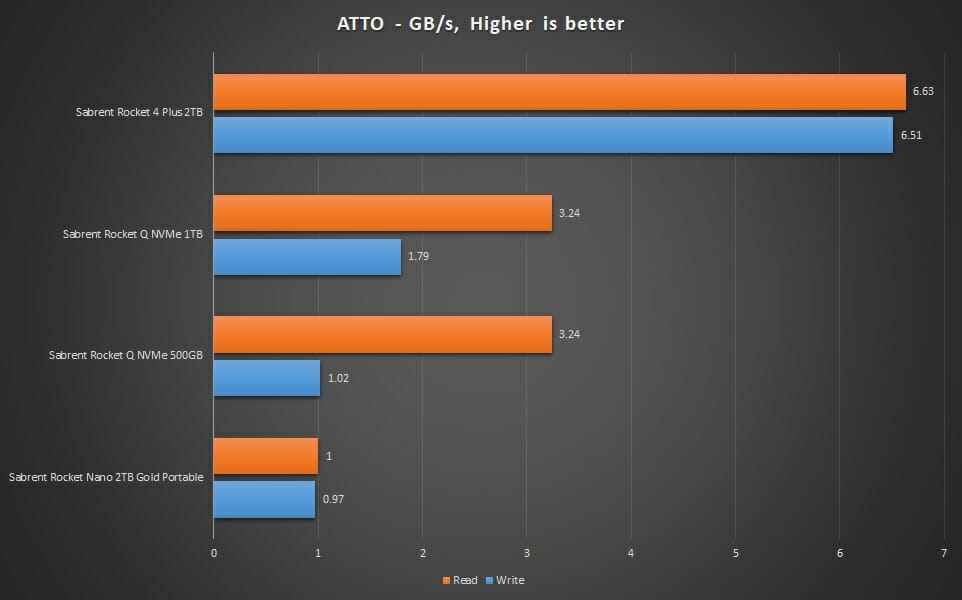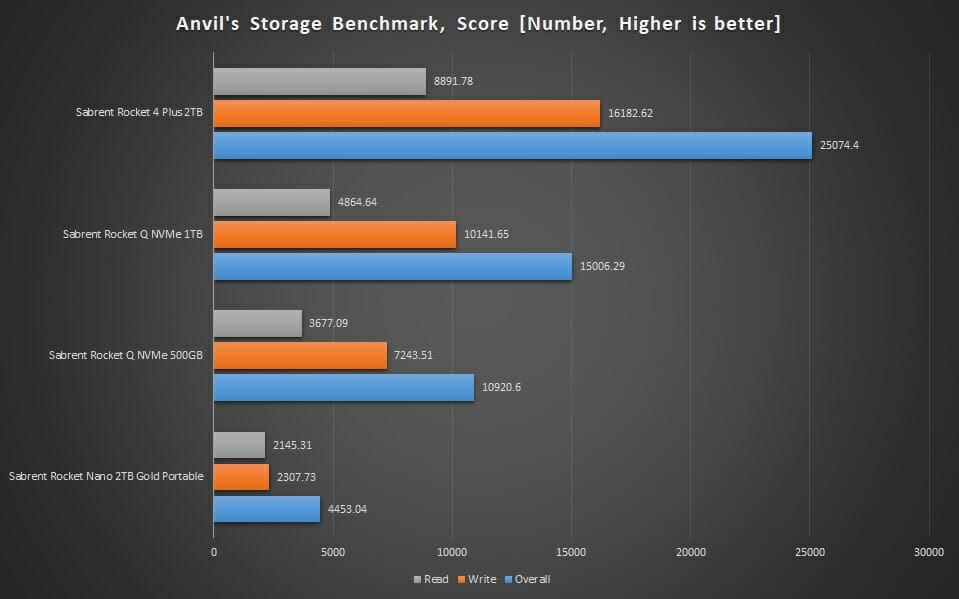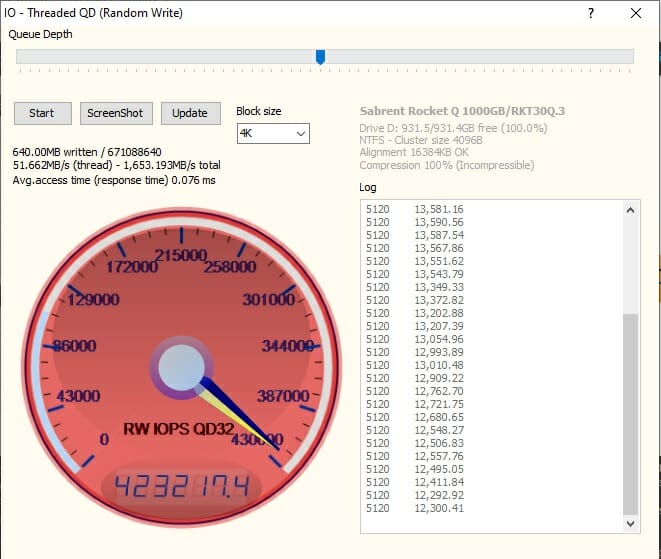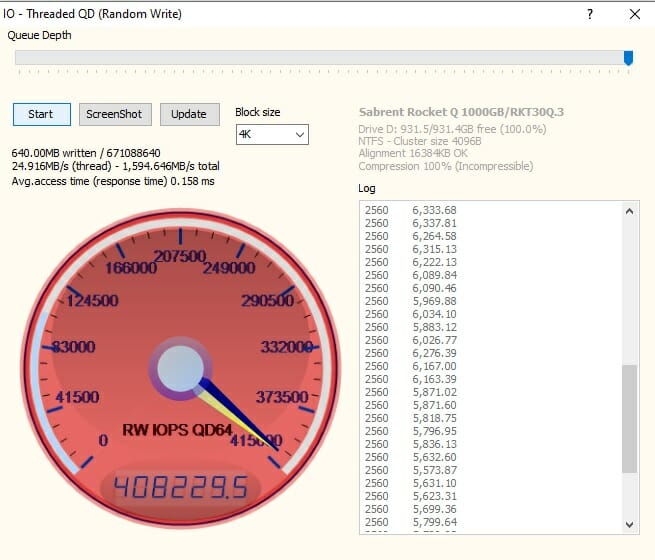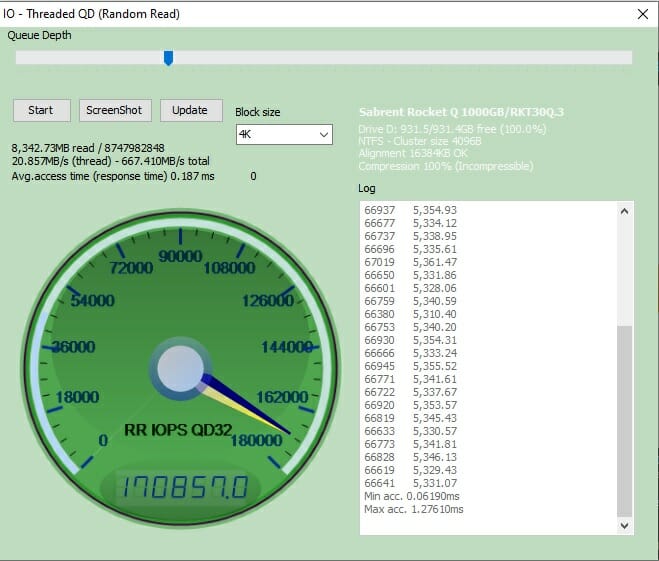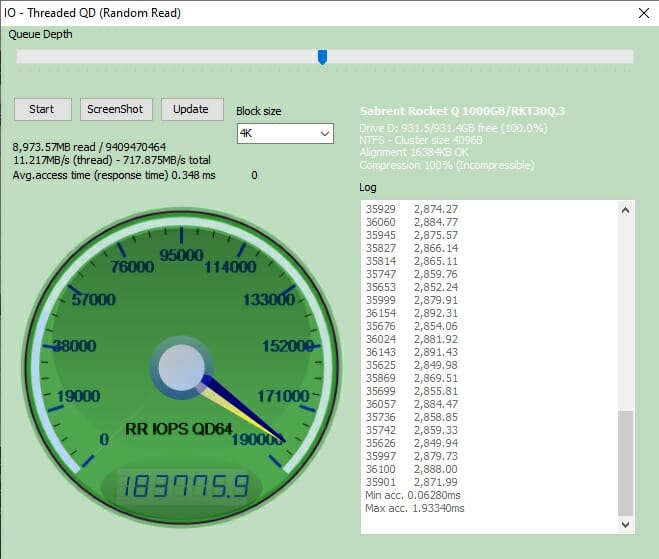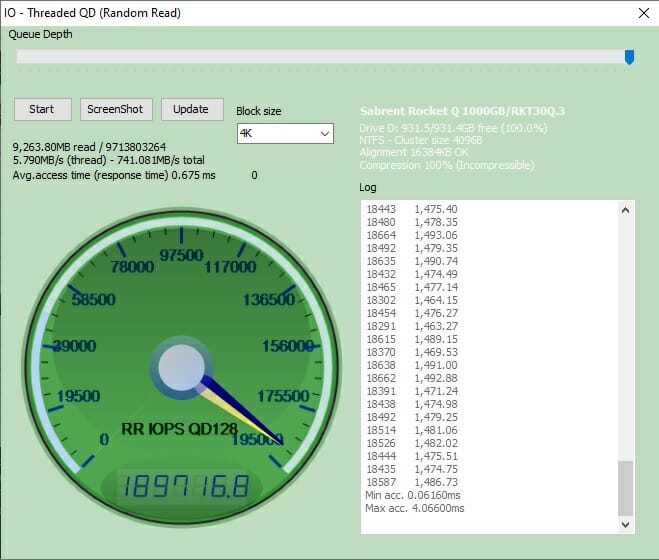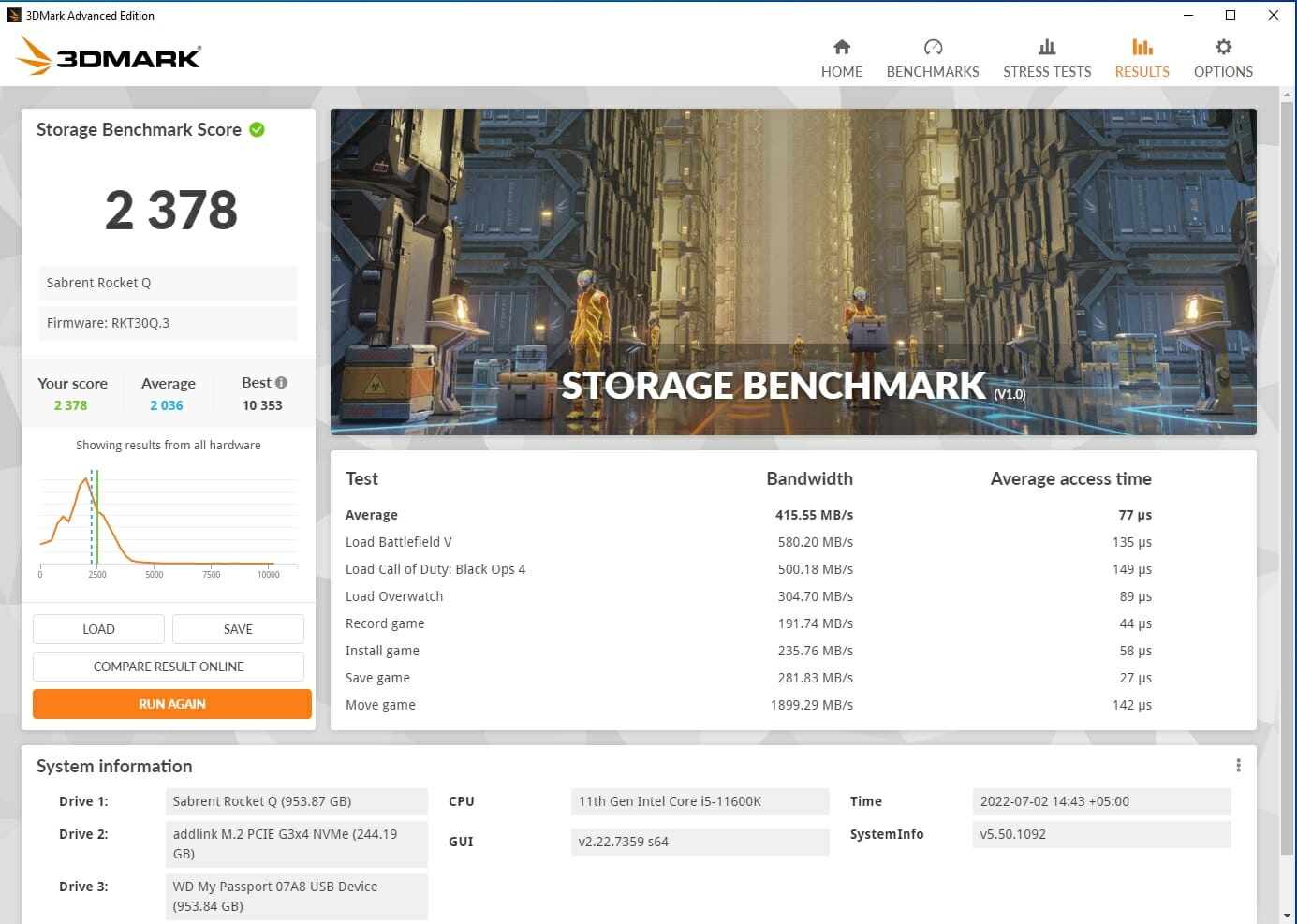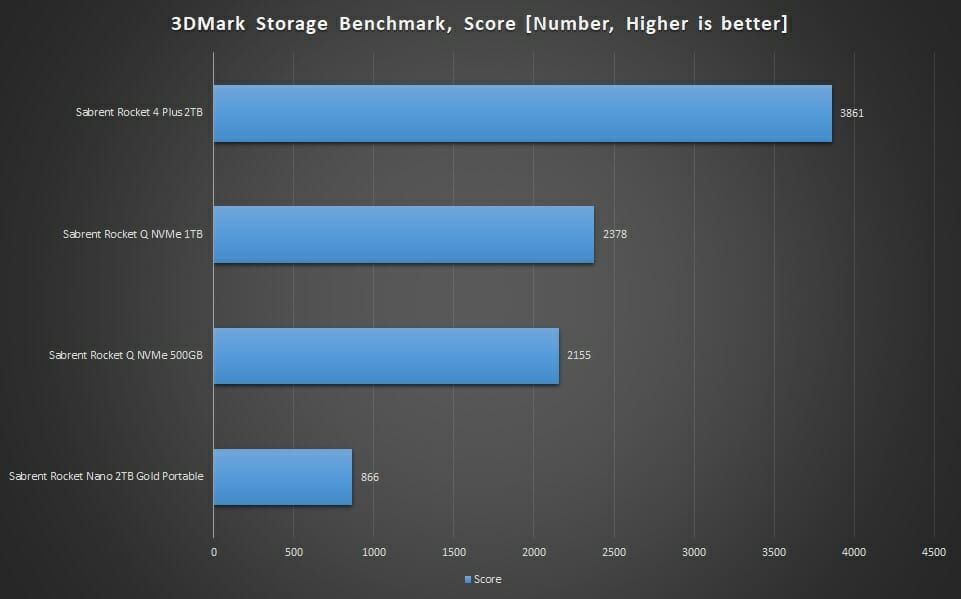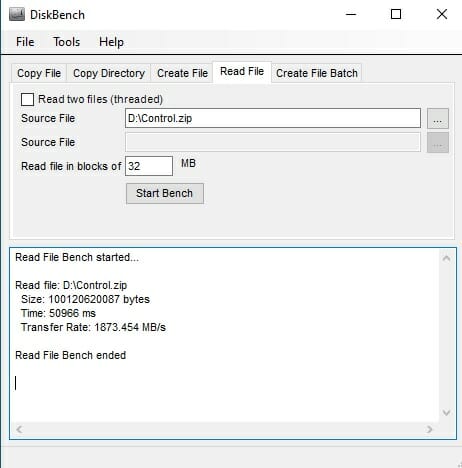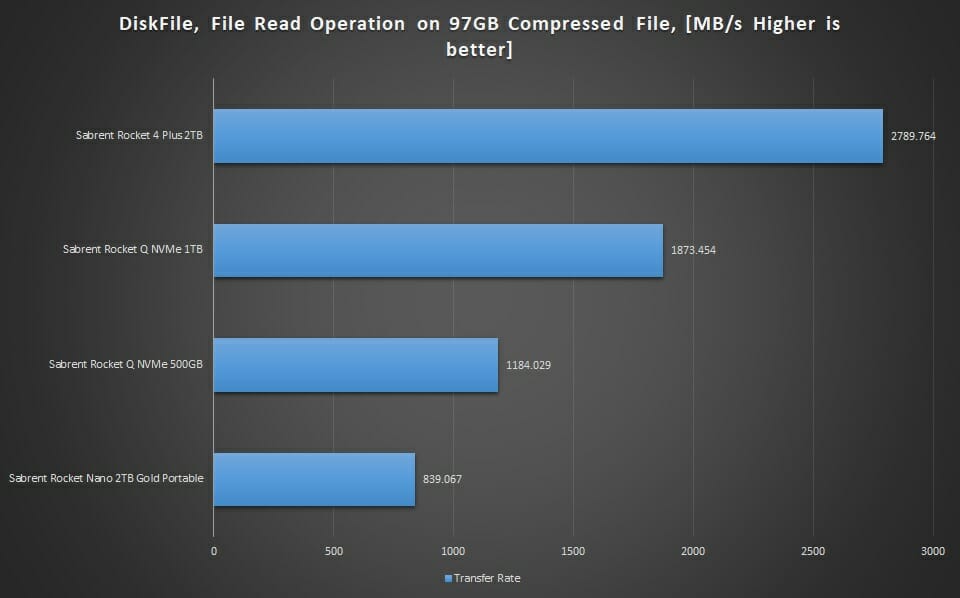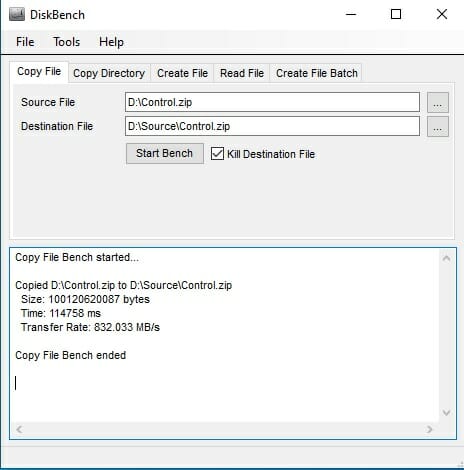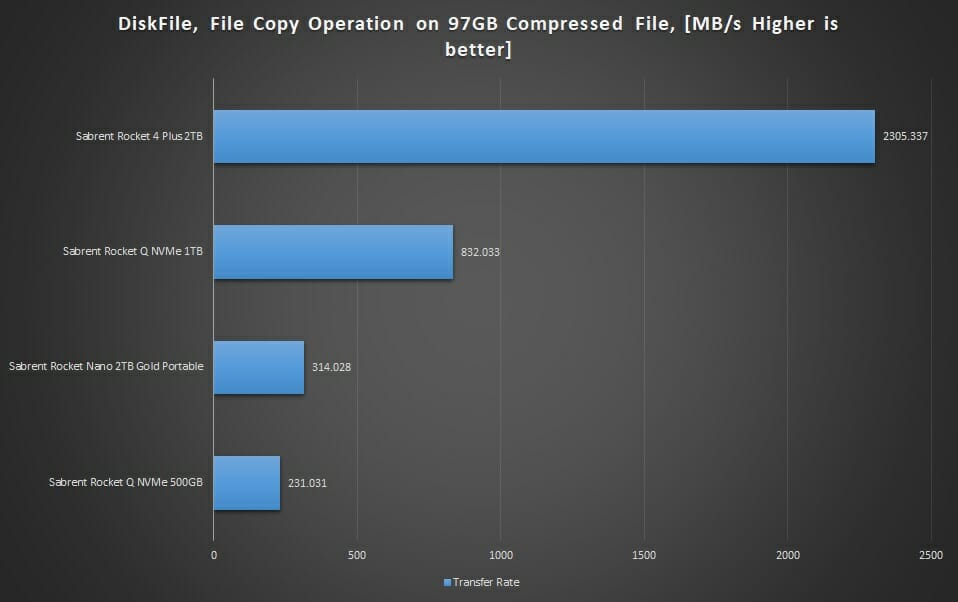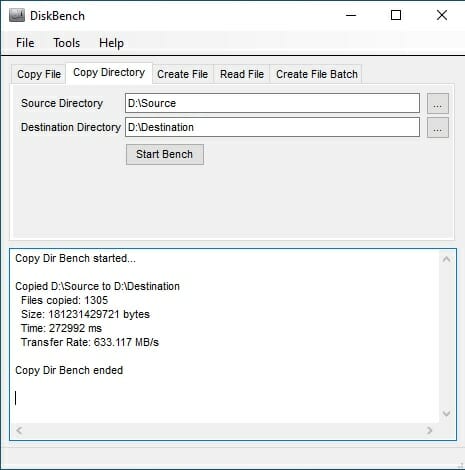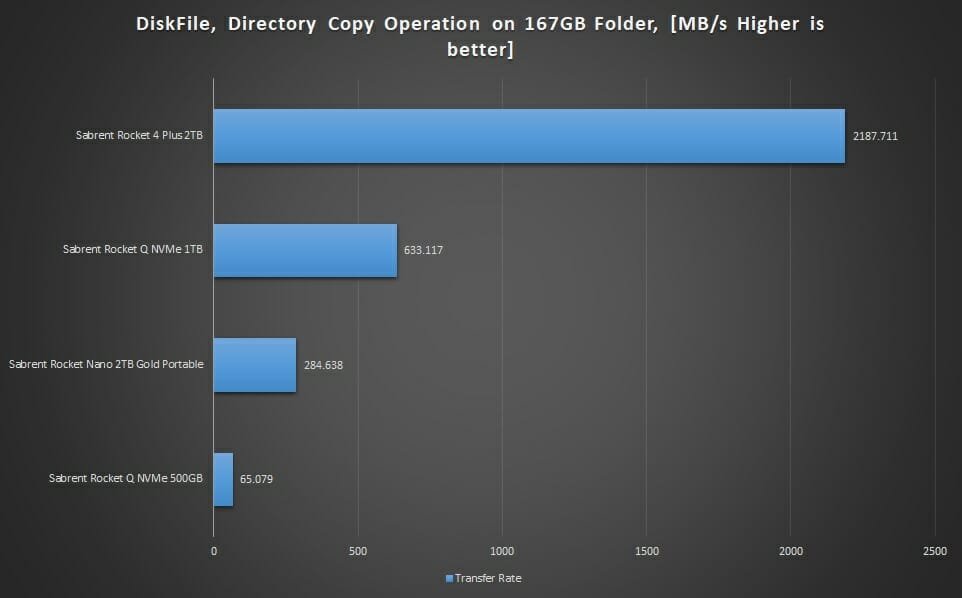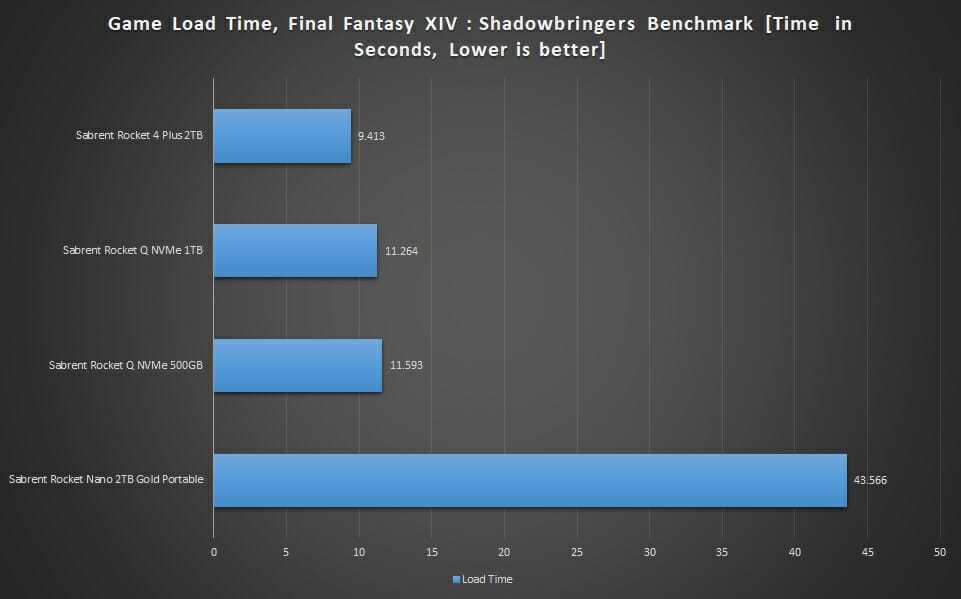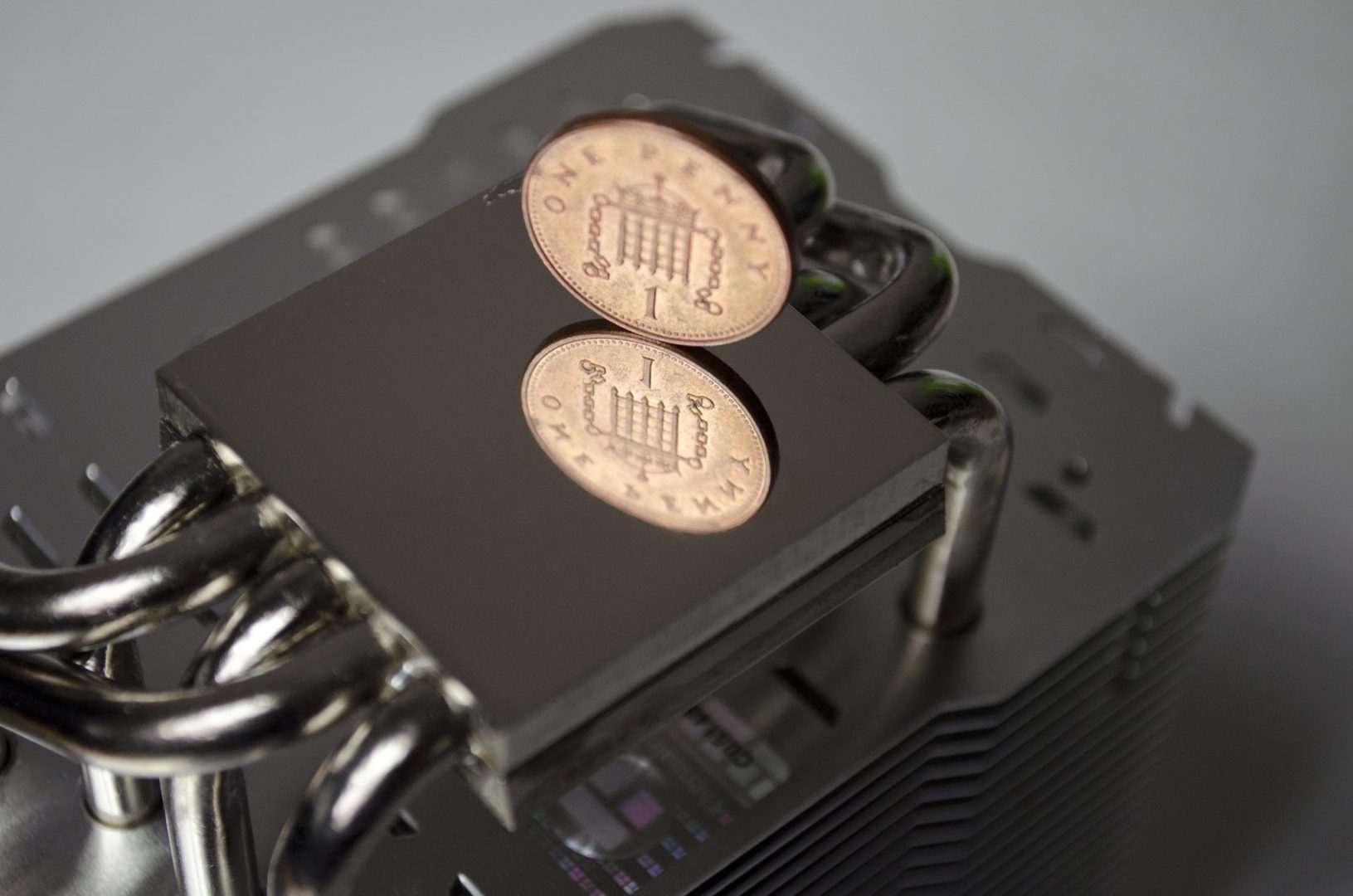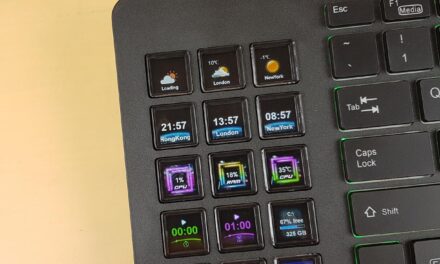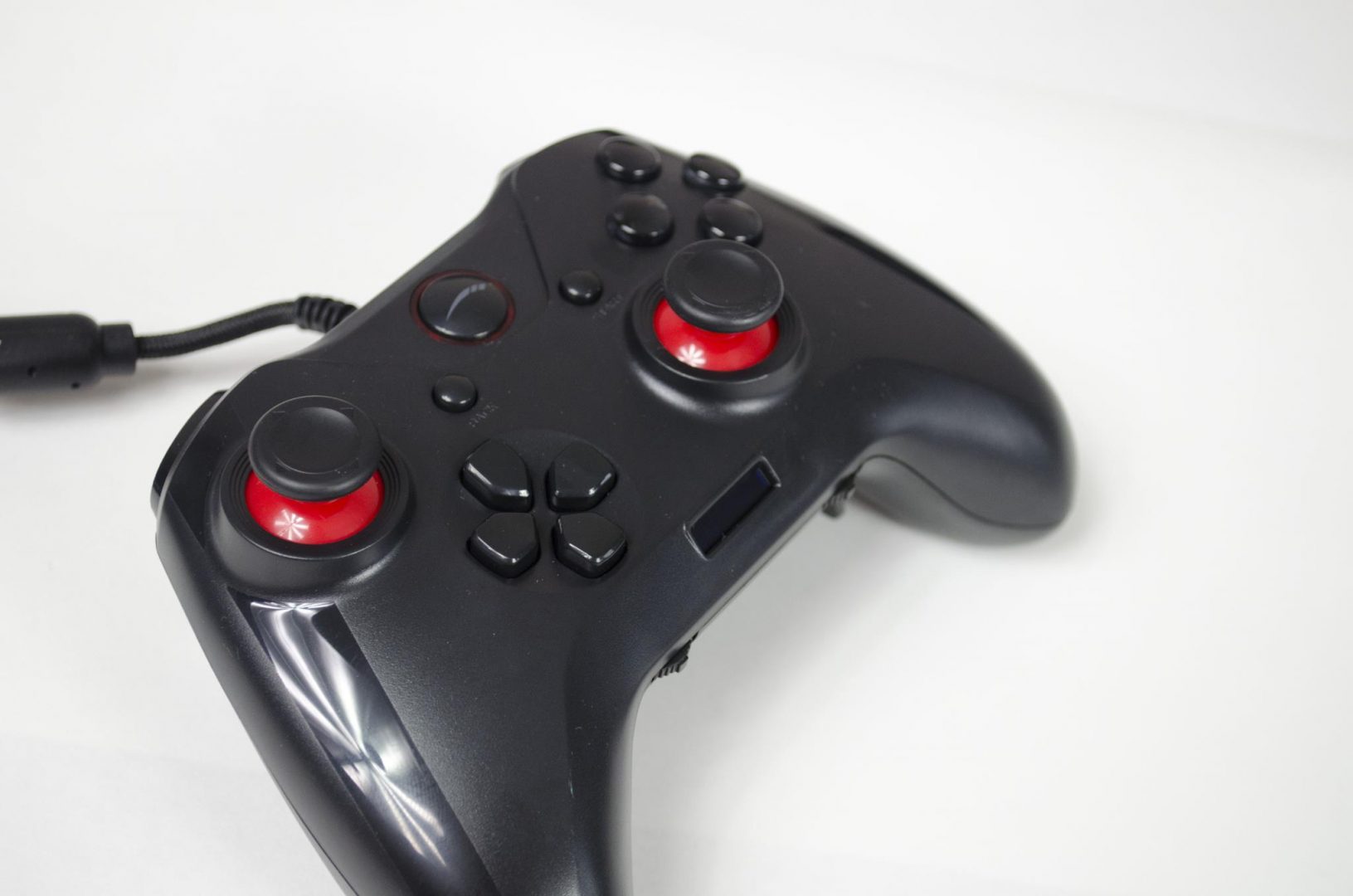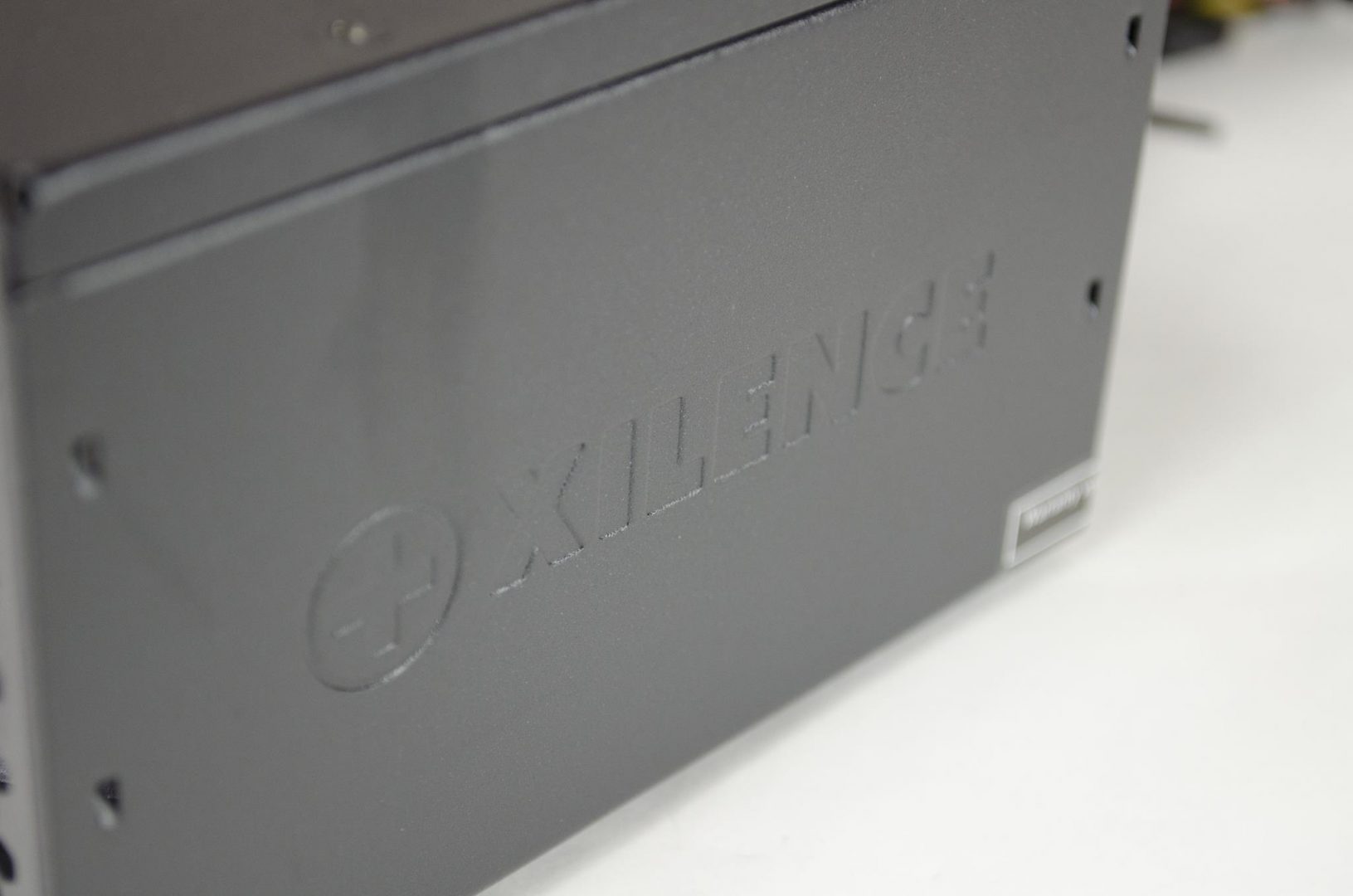
Sabrent Rokcet Q PCIe 3.0 NVMe 1TB SSD Review
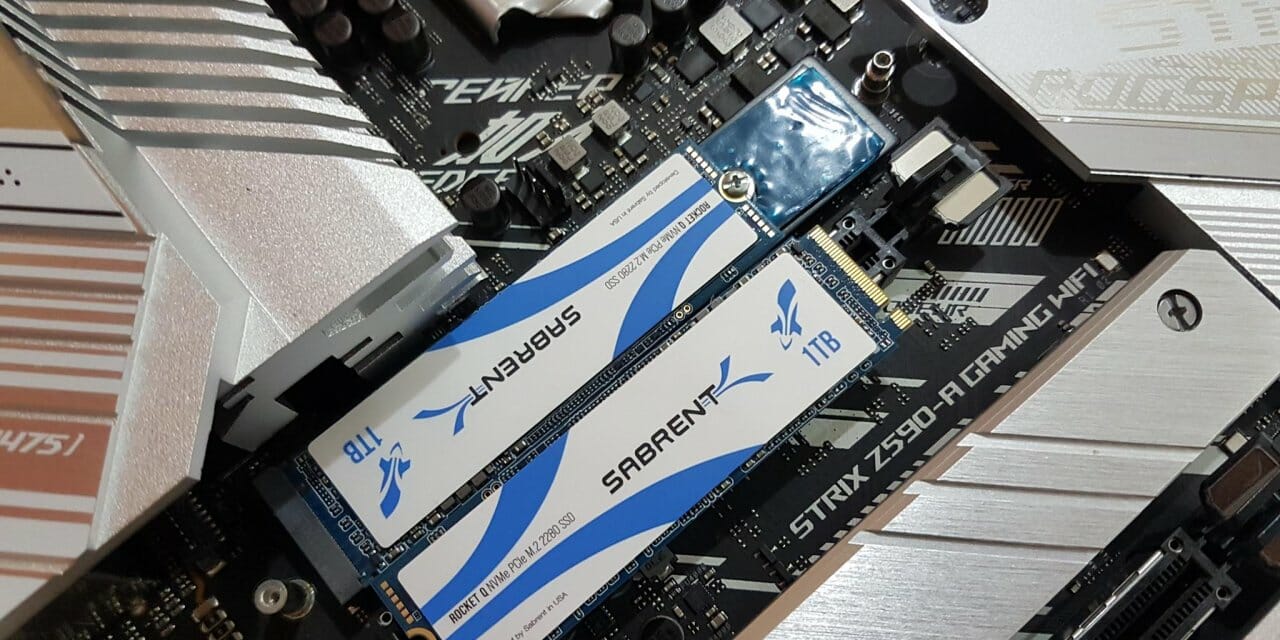
Introduction
We have earlier tested the Sabrent Rocket Q NVMe 500GB SSD drive. This time we are testing the 1TB variant of the Rocket Q. This variant is rated for up to 3200MB/s sequential read and up to 2000MB/s sequential write. The Rocket Q is the budget segment storage solution without compromising the performance of the solution, thanks to QLC NAND technology. This SSD is based on PCIe Gen 3 utilizing 4 lanes (Gen 3 x4). Salient features are:
- 2 PCIe 3.0 x4 interface. Up to 3,200/2,000 MB/s.
- NVMe 1.3 compliant with APST/ASPM/L1.2 power management support.
- Supports SMART, TRIM, and firmware updates with wide flash compatibility.
- Resiliency is ensured through wear-leveling, bad block management, over-provisioning, ECC, RAID, etc.
- Software support including Acronis True Image and sector size formatting utility.
Product: Sabrent Rocket Q NVMe Gen 3 1TB SSD
Price: $89.99 [At the time of the review]
Specifications
Packaging and Unboxing
The drive is shipped inside a paperboard-based packing box which is finished in a white and blue theme.
This drive is using QLC NAND Flash drives and has a 1TB capacity.
The exact model is SB-RKTQ-1TB. There is a hard closure inside the main packing box. It has a sticker label on both sides.
Opening the closure would show the user guide and the SSD along with the SSD cover.
Closer Look
The Rocket Q is an ideal series of fast yet cost-effective storage solutions from Sabrent which is available in multiple capacities ranging from 500GB to as high as a whopping 8TB NVMe SSD. This high storage capacity in a cost-effective manner is coming from the 3D QLC NAND Flash chips. QLC stores more bits per cell as compared to the other NAND flash. TLC is still the favorite going 3D NAND Flash though.
The Sabrent Rocket Q NVMe PCIe 3×4 1TB SSD has an M.2 form factor of 2280. It is an M Key type SSD compatible with the majority of the M.2 slots on modern motherboards.
We are continuously seeing more and more options in M.2 NVMe SSDs based on PCIe 4×4 interface and even in higher densities. Though the pricing of these SSDs is still high as compared to the standard 3.5” HDD which is understandable given the technological differences. These SSDs are using either of SLC, MLC, TLC, and now QLC. Each has its own Pros and Cons in terms of endurance and better performance and is very much related to the pricing. QLC packs 4 bits per cell as compared to 3 on the TLC. While the real benefit of having a QLC is its relatively lower pricing and more data storage capacity, the considerations are lower performance over a period of time, and lower endurance in particular.
The dimension of the SSD is 3.15×0.86×0.11in (LxWxH) and it has a weight of 0.2Oz. The Sabrent Rocket Q series SSDs don’t need a dedicated driver on Microsoft Windows 8.1 and 10. Since these SSDs are using the operating system’s native NVMe driver, there is no dedicated software either by the manufacturer.
There is a white color sticker cover with blue accent Sabrent branding. This would be a handy dandy for the white-themed builds. The drive-in consideration has 1TB capacity and is PCIe Gen3 based using 4 PCIe lanes for connectivity.
The operating temperature of these drives is 0°C to 70°C whereas the storage temperature requirement is -40°C to 85°C. These have a shock resistance of 1500G. The MTBF is mentioned to be 1,800,000 hours. The SSD comes with a 1-year warranty which can be made for 5 years but only with the registration. The TBW (Terrabytes Written) value is mentioned to be 260TB.
Coming to the magic of numbers which the users would love to know, this SSD is rated to do up to 3200 MB/s sequential read speed and up to 2000 MB/s sequential write speed. Not too shabby in this price range, peeps. Coming to 4K stats, this SSD is rated for up to 125K IOPS in Random 4K Read and 500K IOPS in Random 4K Writes. These numbers are provided based on a Queue Depth of 32.
There is a white color large size sticker on the back. It has a part number and a serial number of the drive printed. The drive is rated to draw 4.5W making it efficient as well.
The Rocket Q NVMe PCIe 1TB is a single-sided SSD meaning all the components are on the same side whereas the other side does not have any components. When we say components, we mean the controller, DRAM, NAND Flash, and circuitry.
Take a close look at the above picture. The top sticker paper is on a thin layer of copper to act as a diffuser. I would not remove the top cover for that matter.
Speaking of features, this SSD has:
- 2 PCIe Gen3 x 4 Interface.
- PCIe 3.1 Compliant / NVMe 1.3 Compliant.
- Power Management Support for APST / ASPM / L1.2.
- Supports SMART and TRIM commands. Supports ONFi 2.3, ONFi 3.0, ONFi 3.2 and ONFi 4.0 interface.
- Advanced Wear Leveling, Bad Block Management, and Over-Provision.
- All Sabrent SSDs come with FREE Sabrent Acronis True Image for Sabrent Software for easy Cloning
Speaking of the components, the Rocket Q 1TB NVMe PCIe SSD is powered by the Sabrent RKT 303 controller. This is actually a Phison E12S controller. This controller can be found in the majority of mid-range SSDs. This is in fact showing a smart approach from Sabrent as they are using this controller on the entry-level SSD leveraging the 3D QLC NAND Flash using the powerful controller. This controller is based on TSMC 28nm process technology using a 32bit micro-controller in Dual-CPU architecture with up to 8 channel support.
This SSD packs 4x chips from Micron. Each chip has a 250GB capacity. We have a 2Gbit DDR3L SDRAM cache clocked at 1066MHz using the timing 14-14-14 DDR3L–2133N on the package size of PG-FBGA-96 from UniC.
The above picture shows the ADIA64 Extreme’s S.M.A.R.T status of the Rocket Q NVMe PCIe 1TB SSD.
The above picture shows the CrystalDiskInfo status of the SSD.
Testing
The following configuration is used for testing:
- Intel i5 11600k
- ASUS ROG Strix Z590-A Gaming WiFi
- XPG SpectriX 16GB 2666MHz DDR4 kit
- Noctua L9i chromax.black cooler
- Addlink S68 250GB SSD [OS Drive]
- Nvidia GeForce GTX 1080 FE
- be quiet! Straight Power 11 850W Platinum PSU
We have used the following software:
- AS SSD 1.8.5636.37293
- ATTO Disk Benchmark 4.0
- CrystalDiskMark 6
- Anvil Pro Storage Utilities 1.1.0
- DiskBench
Microsoft Windows 10 is used for the testing.
The above picture shows the disk in the MY Computer (This PC).
Test Results
Superb performance on the sequential read and write speeds from the Rocket Q NVMe 1TB SSD.
We have good results in the 4K Q32 section as well.
Next, we run the AS SSD software to test the performance of the drive. Please, note that each stress testing software works differently and there would be variations between software and between two runs even on the same SSD. We have an overall score of 41823 from this test run.
The 4K 64 threaded result is good as well.
The above is a result of the AS-SSD Copy benchmark. It shows the speed and duration of different workloads giving an idea of the real-world use scenario. We have decent numbers here.
The above pictures show the result of the Compression benchmark run from AS-SSD. Ideally, we would not want dips across the length of the line for both read and write operations. We are seeing a good result from the read operation and it reaches up to 2800MB/s. We are seeing more dips in the write operations. The same was observed when the 500GB variant was tested.
Next, we ran the ATTO Disk Benchmark to test the drive’s performance. We have a maximum read (sequential) speed of 3.24 GB/s which is quite impressive. The average is above 3.0 GB/s as well on the reads. The average write is at 1.79GB/s which is validating Sabrent’s rated write speed (sequential).
The 1TB variant is doing well in the graph.
Next, we ran the Anvil Storage Utilities benchmark to test the performance of the drive. On the default test size of 1GB, the tested read speed score was 4864.64. The write speed score was 10141.65 with an overall score of 15006.29.
The 1TB variant is doing well in the graph.
Next, we ran the IO – Threaded QD Benchmark in the Anvil. Here are the results.
We have a speed of 423217.4 with QD32 in the write operations. This falls short of the rated 500K by the Sabrent.
We got 408229.5 speed with a QD64 in the write operations.
Next, we ran IO – Threaded operations for the read speed using different queue depths. Here are the results
We have 107857 IOPS. The drive falls short of the rated 125K IOPS. Still, the result is closer to the rated speed and there are multiple factors that would contribute to the determination of the overall speed.
When the queue depth was raised to 64, the speed was 183775.9 IOPS which is quite good.
With a queue depth of 128, the read speed was 189716.8 IOPS. The drive is scaling well.
3DMark Storage Test
3DMark Storage test is relatively a new test bench measuring the gaming-only performance of the given drive using three games. It measures the load time of the games, recording the gameplay, saving the game, and moving the game. The overall score is given in the bandwidth and access time.
The Sabrent Rocket Q NVMe 1TB SSD did an average of 415.55MB/s and 77µs.
Real-World Testing
We have used DiskBench in multiple scenarios to check the real-world data transfer rates. Here are the results:
A compressed file of 97GB containing multiple compressed files and folders of different sizes was copied to the Rocket Q NVMe 1TB SSD. The file was then read from the DiskBench. We have a transfer rate of 1873.454 MB/s.
Next, we copied the same compressed file from one folder to another on the same drive. The transfer rate is 832.033MB/s.
Next, we copied a folder of 167GB size containing multiple compressed files, sub-folders, and mixed other files. The transfer rate was 633.117MB/s.
The real-world transfer rates are better compared to the 500GB variant.
Gaming Load Time
Since these NVMe SSDs are also targeted towards gamers alike. We have also calculated the loading time of the game using the Final Fantasy XIV: Shadowbringers Benchmark using High settings.
We have a load time of 11.264 secs.
Thermals
We saw a maximum temperature of 48°C at an ambient temperature of 34°C on the Rocket Q NVMe 1TB SSD.
Conclusion
The Sabrent Rocket Q series is a cost-effective, fast storage solution that is available in high capacities starting from 500GB and going up to 8TB. Much thanks to QLC to achieve this feat! We have earlier tested the 500GB variant in the Rocket Q series. This time we have tested the 1TB variant. The Rocket Q NVMe 1TB is a PCIe Gen 3×4-based SSD. It is M key type SSD using a 2280 form factor. The SSD has a sequential read speed rating of up to 3200MB/s and a sequential write speed of up to 2000 MB/s. The 4K random read and write speed ratings are 125K and 500K IOPS respectively on QD32.
This series of the Rocket Q is driven by the Phison E12S controller. We have four 3D QLC-based NAND flash chips from Micron and DRAM from UniIC. This is a single-sided layout where the components are on a single side. The top cover has a thin layer of copper to act as a diffuser so I would not remove it for better heat dissipation.
The TBW rating is 260. Sabrent is offering a 1-year warranty on this SSD. The user can register the SSD within 90 days of purchasing to get the 5-year warranty. The SSD is PCIe 3.1 compliant with NVMe 1.3 compliance. Power management support for APST/ASPM and L1.2 is provided. It supports the TRIM and SMART commands along with the ONFi 2.3, 3.0, 3.2, and 4.0 interfaces. It features Advanced Wear Leveling, Bad Block Management, and Over-Provision.
In our testing, this drive passed the rated speeds from the manufacturer in the synthetic tests. Sane is the case in the real-world scenario. The Rocket Q NVMe 1TB SSD is listed at $89.99 at the time of this review. The pocket-friendly pricing, fast storage for basic requirements, and 5-years warranty (after registration) are the key highlights of this SSD. The Rocket Q is the budget segment SSDs which will give budget-conscious users a taste of what fast storage can feel like. It comes recommended by us.
We are thankful to Sabrent for the provision of the unit for testing.






